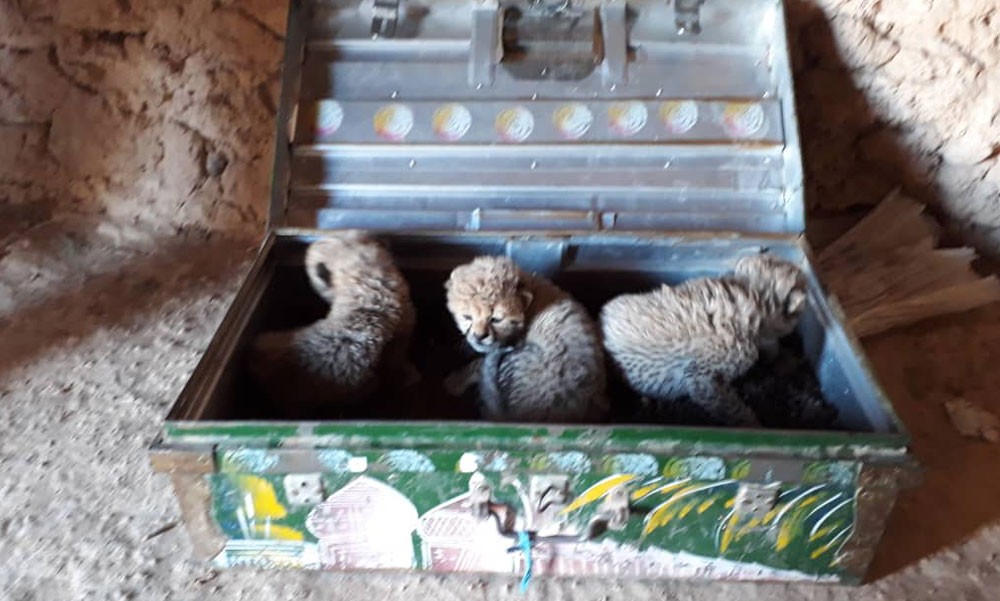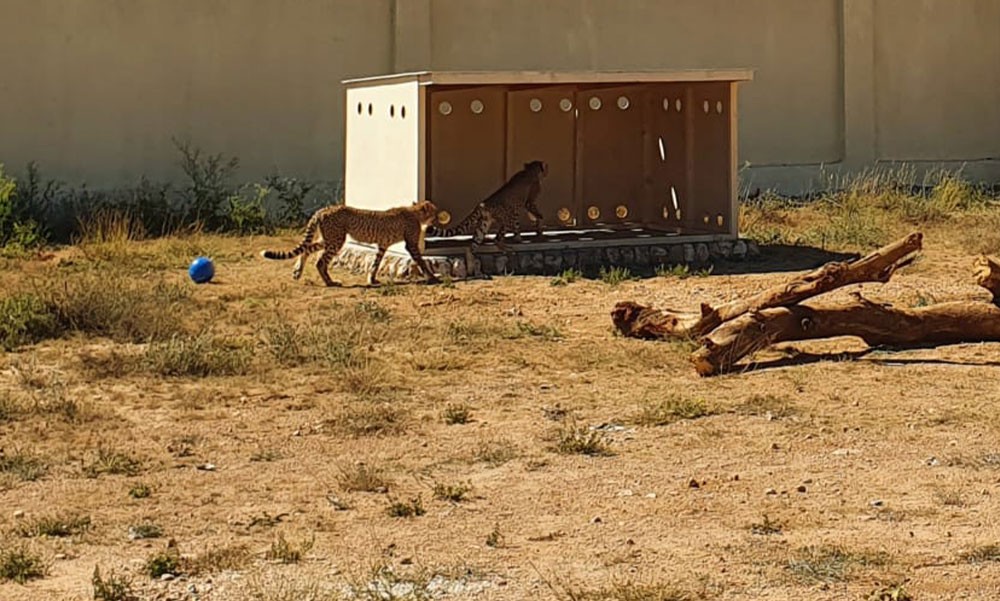Having a cheetah as a pet is generally not a good idea, and PETS.EDU.VN explains why, offering insights into the complexities of cheetah ownership. Cheetahs are wild animals with specialized needs that are difficult to meet in a domestic setting; thus, owning exotic animals like cheetahs is illegal in many areas. Learn about alternative, ethical pet choices and understand the importance of wildlife conservation, and ethical pet ownership practices from PETS.EDU.VN.
1. Understanding the Allure and Reality of Exotic Pets
The allure of owning an exotic pet, such as a cheetah, often stems from a desire to stand out and possess something unique. For some, it’s about the status symbol; for others, it’s a fascination with the wild and untamed. However, the reality of caring for an exotic animal is far different from the fantasy. These creatures have complex needs that are difficult, if not impossible, to meet in a typical household environment. They require specialized diets, specific environmental conditions, and expert veterinary care, which can be incredibly expensive and hard to find.
1.1 The Appeal of Owning a Cheetah
- Status Symbol: In some cultures, owning a cheetah is seen as a sign of wealth and power. Historically, cheetahs were kept by royalty and the elite as hunting companions and symbols of prestige.
- Exotic Charm: The beauty and grace of cheetahs are undeniable. Their unique appearance and behavior can be captivating, leading some to desire them as pets.
- Companionship: Some individuals may believe that a cheetah can offer a unique form of companionship, different from that of a domestic animal.
1.2 The Harsh Realities of Cheetah Ownership
- Specialized Diets: Cheetahs require a diet of raw meat, bones, and organs to meet their nutritional needs. This can be costly and difficult to source consistently.
- Expensive Veterinary Care: Finding a veterinarian with experience in treating cheetahs is challenging. Specialized care and medications can be very expensive.
- Extensive Space Requirements: Cheetahs need vast open spaces to run and exercise. A typical backyard is not sufficient to meet their physical needs.
- Unpredictable Behavior: As wild animals, cheetahs retain their natural instincts. They can be unpredictable and potentially dangerous, especially around children and other pets.
- Ethical Concerns: Removing cheetahs from their natural habitat to be kept as pets contributes to the decline of wild populations and disrupts ecosystems.
1.3 Legal Restrictions on Exotic Pets
Many countries and regions have strict laws regarding the ownership of exotic animals, including cheetahs. These laws are in place to protect both the animals and the public.
Examples of Legal Restrictions:
| Country/Region | Regulations |
|---|---|
| United States | Laws vary by state. Some states ban the possession of exotic animals, while others require permits and strict regulations. |
| United Kingdom | The Dangerous Wild Animals Act 1976 regulates the keeping of certain dangerous wild animals, including cheetahs. A license is required, and strict conditions must be met. |
| European Union | Regulations vary by country. Some EU member states have strict bans on exotic pet ownership, while others have more lenient rules. |
| United Arab Emirates | While there has been a historical demand for cheetahs as pets in this region, laws are increasingly being enforced to prevent illegal trade and ownership. The focus is shifting towards wildlife conservation and protecting endangered species in their natural habitat. |





Owning a cheetah can lead to significant legal consequences, including hefty fines, confiscation of the animal, and even imprisonment.
2. Cheetahs as Pets: Why It’s a Bad Idea
Keeping a cheetah as a pet might seem glamorous, but it’s fundamentally unsuitable and unethical. These animals are not domesticated and have needs that cannot be met in a domestic environment. The physical, behavioral, and ethical considerations make it clear that cheetahs belong in the wild.
2.1 Physical Needs of Cheetahs
Cheetahs are built for speed and require vast open spaces to run and hunt. They can reach speeds of up to 75 miles per hour in short bursts, making a typical backyard completely inadequate.
- Exercise: Cheetahs need to run long distances regularly to maintain their physical health. Confinement can lead to obesity, muscle atrophy, and other health problems.
- Diet: In the wild, cheetahs hunt and consume a variety of prey, providing them with a balanced diet. Replicating this diet in captivity is challenging and expensive. They require raw meat, including bones and organs, to get the necessary nutrients.
- Environment: Cheetahs are adapted to specific climates and habitats. Keeping them in unsuitable environments can lead to health issues and stress.
2.2 Behavioral Needs of Cheetahs
Cheetahs have complex social and behavioral needs that cannot be satisfied in a domestic setting.
- Social Interaction: In the wild, cheetahs live in social groups or as solitary hunters, depending on their gender and life stage. They require interaction with other cheetahs to develop and maintain healthy social behaviors.
- Hunting Instincts: Cheetahs are natural hunters. Without the opportunity to hunt, they can become bored, frustrated, and develop behavioral problems.
- Territoriality: Cheetahs mark their territory using scent glands and urine. This behavior is impossible to replicate indoors, leading to unsanitary and unpleasant living conditions.
2.3 Ethical Considerations of Cheetah Ownership
Owning a cheetah raises serious ethical concerns about animal welfare and conservation.
- Animal Welfare: Cheetahs kept as pets often suffer from poor physical and psychological health due to inadequate living conditions and care.
- Conservation: The illegal trade in cheetahs as pets contributes to the decline of wild populations. Cubs are often taken from their mothers at a young age, disrupting social structures and reducing the chances of survival for the remaining wild cheetahs. According to the Cheetah Conservation Fund, an estimated 300 cheetah cubs are taken from the wild each year, primarily from the Horn of Africa, to be sold illegally as pets.
- Public Safety: Cheetahs are powerful predators and can pose a threat to public safety. Even if raised in captivity, they retain their wild instincts and can be unpredictable.
3. The Illegal Wildlife Trade and Cheetahs
The illegal wildlife trade is a major threat to cheetah populations. Driven by demand for exotic pets and traditional medicine, this trade involves the capture and sale of live animals and their parts, often with devastating consequences for wildlife.
3.1 Drivers of the Illegal Cheetah Trade
- Demand for Exotic Pets: The desire to own a unique and exotic pet fuels the illegal trade in cheetahs, particularly in the Middle East.
- Poverty and Human-Wildlife Conflict: In some regions, rural communities may capture and sell cheetah cubs to supplement their income or as retaliation for livestock losses. Climate change exacerbates these issues.
- Lack of Enforcement: Weak laws and inadequate enforcement in source countries allow traffickers to operate with impunity.
3.2 The Impact on Cheetah Populations
- Population Decline: The removal of cheetahs from the wild disrupts breeding patterns and reduces the overall population size.
- Genetic Diversity Loss: The illegal trade can lead to the loss of genetic diversity within cheetah populations, making them more vulnerable to disease and environmental changes.
- Ecosystem Disruption: The removal of a top predator like the cheetah can have cascading effects on the ecosystem, leading to imbalances and biodiversity loss.
3.3 Efforts to Combat Illegal Trade
Organizations like the Cheetah Conservation Fund (CCF) and the Convention on International Trade in Endangered Species (CITES) are working to combat the illegal trade in cheetahs through various initiatives:
- Rescue and Rehabilitation: CCF operates safe houses and rescue centers for confiscated cheetah cubs, providing them with veterinary care and rehabilitation.
- Law Enforcement Training: CCF trains wildlife officials, police, and legal professionals in the Horn of Africa to combat wildlife trafficking.
- Community Outreach: CCF conducts outreach programs in communities where trafficking is known to occur, raising awareness about the impacts of the illegal trade and promoting alternative livelihoods.
- Policy Advocacy: CCF advocates for stronger laws and regulations to protect cheetahs and combat wildlife trafficking at national and international levels.
- Demand Reduction: CCF works with partners in the Middle East to reduce the demand for cheetahs as pets through education and awareness campaigns.
4. The Role of Conservation Organizations
Conservation organizations play a critical role in protecting cheetahs and their habitats. These organizations work on a variety of fronts, from conducting research and monitoring populations to implementing conservation programs and advocating for policy changes.
4.1 Key Conservation Organizations
- Cheetah Conservation Fund (CCF): CCF is a leading organization dedicated to the conservation of cheetahs and their ecosystems. Founded in 1990 by Dr. Laurie Marker, CCF operates a research and conservation center in Namibia and works in several other countries to protect cheetahs.
- Convention on International Trade in Endangered Species (CITES): CITES is an international agreement that regulates trade in endangered species, including cheetahs. CITES helps to ensure that international trade does not threaten the survival of these species in the wild.
- IUCN Cat Specialist Group: The IUCN Cat Specialist Group is a global network of experts that provides scientific information and advice on the conservation of wild cats, including cheetahs.
- World Wildlife Fund (WWF): WWF works to conserve cheetahs and their habitats through various programs, including anti-poaching patrols, community conservation initiatives, and policy advocacy.
4.2 Conservation Strategies and Programs
- Habitat Protection: Protecting and managing cheetah habitats is essential for their survival. This can involve establishing protected areas, working with local communities to promote sustainable land use practices, and mitigating human-wildlife conflict.
- Anti-Poaching Efforts: Cheetahs are often targeted by poachers for their skins and body parts. Anti-poaching patrols and law enforcement efforts are crucial for protecting cheetahs from illegal hunting.
- Community Conservation: Engaging local communities in conservation efforts is essential for long-term success. This can involve providing economic incentives for conservation, promoting sustainable livelihoods, and empowering communities to manage their natural resources.
- Research and Monitoring: Conducting research and monitoring cheetah populations is crucial for understanding their status and trends. This information can be used to inform conservation strategies and track their effectiveness.
- Education and Awareness: Raising awareness about the threats facing cheetahs and the importance of conservation is essential for garnering public support and changing behavior.
4.3 How PETS.EDU.VN Supports Ethical Pet Ownership
At PETS.EDU.VN, we advocate for responsible and ethical pet ownership. We understand the allure of unique animals, but we prioritize the well-being of all creatures, especially those that belong in the wild. Our platform provides resources and information on:
- Choosing the Right Pet: Guidance on selecting pets that are well-suited to domestic life and your lifestyle.
- Proper Pet Care: Comprehensive guides on nutrition, health, and behavioral needs of various domestic animals.
- Supporting Conservation: Information on how to support conservation efforts and make ethical choices as a pet owner.
- Adoption and Rescue: Promoting the adoption of animals from shelters and rescue organizations.
5. Alternatives to Owning a Cheetah
If you’re fascinated by cheetahs and want to support their conservation, there are many ethical alternatives to owning one.
5.1 Supporting Conservation Organizations
- Donate: Make a financial contribution to organizations like the Cheetah Conservation Fund to support their work in protecting cheetahs and their habitats.
- Sponsor a Cheetah: Many conservation organizations offer cheetah sponsorship programs, where you can symbolically adopt a cheetah and receive updates on its progress.
- Volunteer: If you have the time and resources, consider volunteering with a conservation organization to help with research, education, or other activities.
5.2 Ethical Tourism
- Visit Sanctuaries: Visit reputable wildlife sanctuaries and conservation centers that provide a safe and natural environment for cheetahs and other animals.
- Go on Safari: Take an eco-friendly safari to observe cheetahs in their natural habitat. Choose tour operators that prioritize conservation and community engagement.
5.3 Educate Yourself and Others
- Learn About Cheetahs: Read books, watch documentaries, and visit websites to learn about cheetah biology, behavior, and conservation status.
- Spread Awareness: Share information about the threats facing cheetahs and the importance of conservation with your friends, family, and social media followers.
6. Fostering a Love for Animals Ethically
Fostering a love for animals can be achieved through many ethical avenues that don’t involve owning exotic or wild species. These alternatives not only satisfy our desire to connect with animals but also contribute to their well-being and conservation.
6.1 Domestic Pets: A World of Companionship
- Dogs and Cats: The most common and rewarding option is to adopt a dog or cat from a local shelter. Domestic pets have evolved alongside humans for thousands of years, making them ideal companions.
- Small Mammals: Guinea pigs, rabbits, and hamsters can be excellent pets for those with limited space. They are relatively easy to care for and offer a unique form of companionship.
- Birds: Parrots, canaries, and finches can bring joy with their songs and vibrant colors. However, they require specialized care and attention to thrive.
6.2 Volunteering at Animal Shelters
Volunteering at animal shelters is a rewarding way to interact with animals and contribute to their well-being. You can help with feeding, grooming, walking, and providing socialization to animals in need.
6.3 Virtual Experiences: Connecting from a Distance
- Live Cams: Many zoos and wildlife sanctuaries offer live webcams that allow you to observe animals in their natural habitats from the comfort of your own home.
- Virtual Reality: Virtual reality experiences can transport you to exotic locations and allow you to interact with animals in a simulated environment.
6.4 Supporting Local Wildlife
- Birdwatching: Birdwatching is a great way to connect with nature and learn about local bird species. You can set up a bird feeder in your backyard and observe the birds that visit.
- Creating Wildlife Habitats: You can create a wildlife-friendly garden by planting native plants, providing water sources, and creating shelter for animals.
By engaging in these ethical alternatives, you can satisfy your love for animals while promoting their welfare and conservation.
7. The Future of Cheetah Conservation
The future of cheetah conservation depends on continued efforts to combat illegal trade, protect habitats, and engage local communities. By working together, we can ensure that these magnificent animals thrive for generations to come.
7.1 Innovations in Conservation Technology
- GPS Tracking: GPS collars allow researchers to track cheetah movements and behavior, providing valuable data for conservation planning.
- Camera Traps: Camera traps are used to monitor cheetah populations and identify threats such as poaching and habitat loss.
- Genetic Analysis: Genetic analysis can help to identify distinct cheetah populations and inform conservation strategies.
7.2 Empowering Local Communities
- Community-Based Conservation: Engaging local communities in conservation efforts is essential for long-term success. This can involve providing economic incentives for conservation, promoting sustainable livelihoods, and empowering communities to manage their natural resources.
- Education Programs: Education programs can raise awareness about the importance of cheetah conservation and promote responsible behavior.
7.3 Policy and Legislation
- Strengthening Laws: Stronger laws and regulations are needed to protect cheetahs and combat wildlife trafficking.
- International Cooperation: International cooperation is essential for addressing the global challenges facing cheetah conservation.
8. Conclusion: Choosing Compassion over Possession
While the idea of owning a cheetah might seem appealing to some, it is ultimately an unsuitable and unethical choice. These magnificent animals belong in the wild, where they can roam freely, hunt, and interact with their own kind. By supporting conservation organizations, engaging in ethical tourism, and educating yourself and others, you can contribute to the preservation of cheetahs and their habitats. Remember, true admiration comes from respecting and protecting wildlife, not from possessing it. Visit PETS.EDU.VN for more insights on ethical pet ownership and wildlife conservation.
9. FAQ: Cheetahs as Pets
9.1 Is it legal to own a cheetah?
Laws vary, but generally, it is illegal or requires strict permits to own a cheetah due to their endangered status and the dangers they pose.
9.2 What are the main reasons cheetahs don’t make good pets?
Cheetahs have specialized dietary, exercise, and social needs that are impossible to meet in a typical household environment.
9.3 How does the illegal pet trade affect cheetah populations?
The illegal pet trade leads to population decline, genetic diversity loss, and ecosystem disruption as cheetahs are removed from their natural habitats.
9.4 What can I do to help cheetah conservation?
You can donate to conservation organizations, support ethical tourism, educate yourself and others, and advocate for stronger wildlife protection laws.
9.5 What are some ethical alternatives to owning a cheetah?
Ethical alternatives include volunteering at animal shelters, supporting conservation organizations, and observing wildlife in their natural habitats through ethical tourism.
9.6 How do conservation organizations combat illegal wildlife trade?
Conservation organizations work on rescue and rehabilitation, law enforcement training, community outreach, policy advocacy, and demand reduction.
9.7 What role do local communities play in cheetah conservation?
Local communities are essential for long-term success through community-based conservation, education programs, and sustainable livelihood initiatives.
9.8 What are some innovations in conservation technology?
Innovations include GPS tracking, camera traps, and genetic analysis, which help researchers monitor cheetah populations and behaviors.
9.9 How can I create a wildlife-friendly habitat in my backyard?
You can plant native plants, provide water sources, and create shelters to attract and support local wildlife.
9.10 Where can I find reliable information about ethical pet ownership?
Visit PETS.EDU.VN for comprehensive guides on responsible pet care, ethical choices, and wildlife conservation.
For more information on how you can support ethical pet ownership and cheetah conservation, visit PETS.EDU.VN.
PETS.EDU.VN
Address: 789 Paw Lane, Petville, CA 91234, United States
WhatsApp: +1 555-987-6543
Website: pets.edu.vn
By understanding the complexities and realities of owning wild animals, and the importance of conservation, we can make informed decisions that support the well-being of all animals.